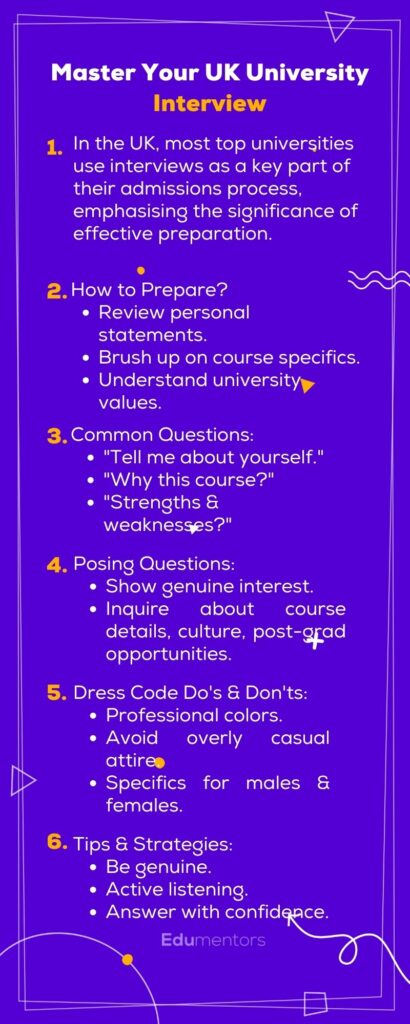Guide to University Interviews in the UK
The journey to a UK university often hinges on a critical juncture: the university interview. It’s not just about answering a few university interview questions or wondering what to wear to a university interview. For many students preparing for this moment, the entire experience encapsulates a blend of excitement, curiosity, and, understandably, a few nerves.
Interviews aren’t just a formality; they are a significant phase in your academic odyssey. This is the moment where you can stand out, addressing questions such as tell me about yourself university interview or exploring common university interview questions that delve into your aspirations, passion, and knowledge. Equally, it’s a window for you to pose your questions to ask at university interview, ensuring you make an informed choice about your future.
Understanding how to prepare for a university interview is essential. This not only gives you the confidence to answer university interview questions and answers UK style but also allows you to evaluate the institution in return. After all, university interviews are as much about you understanding the institution’s ethos, teaching methods, and environment, as they are about the university getting to know you.
In this comprehensive guide, we’ll navigate through the intricacies of the university interview process in the UK. As students progress from GCSEs to higher levels like A Levels or IB, the journey towards university becomes more focused, and interviews are a key part of that final step. Whether you’re mulling over the university interview dress code or seeking sample answers to popular questions, this article promises a blend of insights, practical tips, and an engaging look into making your interview experience a memorable one. So, if you’re a student eager to make a mark, read on to arm yourself with the knowledge and confidence needed for your big day.
Understanding University Interviews
For many UK students, the mere thought of university interview questions can trigger bouts of anxiety. If you’re in the throes of university preparation, questions such as “What questions will I be asked at a university interview?” or “Are university interviews hard?” might be occupying your mind. By diving deep into the structure, intensity, and types of interviews, you can cast aside uncertainties and step into your interview with confidence.
What to Expect in a University Interview
The question of what to expect in a university interview looms large for most applicants. Universities in the UK use these interviews as a tool to probe beyond your academic scores. Their primary intent is to evaluate your zest for the course and to judge how seamlessly you’d blend into their academic culture. While you can certainly anticipate some common university interview questions, be prepared for discussions surrounding your subject of interest, reflections on your personal statement, and deeper dives into why you chose the particular course. Don’t be surprised if you’re also presented with scenarios or debates on current topics to measure your analytical and critical thinking abilities.
Are University Interviews Hard?
For students navigating the world of higher education, the query “are university interviews hard?” is omnipresent. The reality is that they can be demanding, primarily due to the competitive essence of university slots. Prestigious universities, with their stringent criteria, look beyond mere rote knowledge. They’re on the lookout for individuals radiating a genuine passion for their chosen field, backed by an earnest desire to prepare for a student interview and shine. It’s not just about the answers you provide, but the questions you ask, signaling your engagement. Thus, having some questions to ask at a university interview in your arsenal can be advantageous.
Different Types of University Interviews
The UK’s diverse higher education sector ensures a variety of interview formats:
Conventional Discussion-Based interviews
Here, the name of the game is direct interaction. Whether it’s a single interviewer or a panel, expect discussions around your application, future aspirations, and a probable exploration of how you’d introduce yourself in a university interview.
Oxbridge Interviews
Recognised for their idiosyncratic nature, interviews at Oxford and Cambridge are in a league of their own. They often involve intricate problem-solving tasks and delve deep into subject-specific topics, ensuring you’re not just rehearsing university interview questions and answers but truly understanding your field.
Multiple-Mini Interviews (MMI)
An emerging favorite, especially for disciplines like Medicine, MMIs are akin to a relay race of short, timed interview stations. Each stop is designed to gauge unique qualities, providing a rounded perspective of your suitability for the course.
Grasping the varied nature of these interviews is pivotal. It helps in custom-tailored preparations, ensuring students don’t just seek university interview tips but implement them effectively, transforming the interview from a daunting hurdle to a promising opportunity.
How to Prepare for a University Interview

Securing an invitation to a university interview is already a commendable achievement, but it’s only half the battle. Preparing for it requires diligent effort and foresight. By now, a myriad of thoughts like “how to prepare for a university interview?” or “what to say in a university interview?” might be flooding your mind. Understanding that the interview is one of several critical components for admission to top universities in the UK can help you approach it with the right mindset.
Techniques to Impress an Interviewer
The golden query every student is eager to decode: How can I impress a university interviewer? The truth lies in more than just memorized university interview questions and answers. Here are some strategies to leave a lasting impact:
Revisit and Reflect
Before anything else, pour over your personal statement. Universities often use this as a blueprint for their questions. Knowing it inside-out ensures you’re never caught off-guard.
Body Language
A firm handshake, maintaining eye contact, and exuding confidence can set a positive tone even before you answer your first query, such as the perennial tell me about yourself university interview question.
Active Listening
Remember, an interview is a two-way street. Active listening can help you give thoughtful answers and even formulate insightful questions to ask at university interview.
Showcasing Passion
Your passion for the course should be palpable. Share experiences, projects or readings that resonate with your chosen subject. This proves you’re not just prepped with rehearsed university interview questions and answers UK based, but you’re genuinely invested in your academic journey.
Anticipating the Unexpected
Interviewers are adept at throwing curveball questions to gauge your reaction and thinking process. But how do you navigate these unexpected turns?
Stay Calm and Collected. Remember that it’s not just about the right answer but your thought process. Manage your nerves and think aloud if needed.
Reflect on Personal Experiences
Often, open-ended questions like “tell me about a time when…” or “describe an instance where…” can be best answered by drawing from personal experiences.
Prepare for Broad Questions
Questions such as “tell me about yourself” might seem daunting due to their broad nature. Craft a concise narrative, intertwining your academic and personal journeys, and rehearse it.
Flip the Script
Unexpected questions are opportunities in disguise. They allow you to steer the conversation, showcase your strengths, or even segue into good questions to ask at the end of a university interview.
Preparation is the linchpin to nailing your university interview. A blend of anticipation, understanding, and genuine enthusiasm can make the interview not just a test of your abilities, but a testament to your passion and potential.
Navigating Common Interview Questions
University interviews are less about the ‘right’ answer and more about understanding how you think and engage with a topic. While the anticipation of university interview questions can be daunting, equipping yourself with a strategy to navigate them can make all the difference. As you consider what to say in a university interview, remember that the motive behind these common questions is often to gauge your passion, clarity, and thought process.
Introduction to University Interview Questions
At the heart of many university interview questions and answers lies a quest for understanding the student. Before we delve into typical questions, it’s paramount to comprehend the underlying intent of these questions. They aren’t just to test your knowledge, but to assess:
Your Fit for the Course
Questions are often tailored to see if you have the aptitude and interest that align with the demands of the course.
Your Personality
How do you approach challenges? Are you a team player or a lone wolf? Many questions aim to unveil aspects of your character.
Your Motivations
Beyond just wanting to study, they want to ascertain why you’re choosing this specific course, university, or career path.
Breaking Down Typical Questions

Tell me about yourself – University Interview Edition
Crafting your response to this open-ended question is pivotal. Stitch together a personal narrative that connects your past achievements, current interests, and future aspirations. Keep it concise, yet captivating.
Strengths and Weaknesses
When confronted with the what are your strengths and weaknesses question, it’s not just about listing traits. It’s about substantiating them with real-life examples. For weaknesses, showcase self-awareness and how you’re actively working on them.
Your Motivations
A commonly posed question is about why you chose a particular course. Instead of generic answers, delve deep into your inspirations, experiences, and aspirations linked to the course.
To truly shine in these interviews, focus on authenticity. While it’s essential to prepare, your answers should resonate with your genuine beliefs and aspirations. Combine this with the knowledge you’ve accrued, and you’re on your way to making a lasting impression.
What Inspired Your University Choice? – A Fresher’s Perspective
If you’re applying for an undergraduate program, anticipate this question tailored especially for those new to the university scene. Discussing your A-level subjects, extracurricular activities, or your perspective on recent industry-related news can be impactfull here. Reflect on the experiences and inspirations that have shaped your academic and extracurricular journey so far, and how they’ve influenced your university and course choice. Your answer should paint a vivid picture of your passion and commitment to your chosen field of study.
Why You Should Pose Questions on an Interview
Engaging actively during your university interview doesn’t only mean answering questions – it’s also about asking the right ones. Demonstrating genuine interest in the course, university culture, and potential opportunities for post-graduation shows your enthusiasm and preparedness. But what should you inquire about? Let’s break it down.
Key Question Addressed
Do You Have Any Questions for Me?
It’s almost inevitable. As the interview wraps up, the interviewer will likely turn the tables, offering you the chance to become the inquisitor. Do you have any questions for me? This is not merely a polite afterthought. Your response can be just as telling as your answers to their questions. It’s a golden opportunity to show your eagerness and diligent research. Refrain from asking questions that can be easily found on the university’s website.
Good Questions to Ask at the End of a University Interview
You might be teeming with queries, or you might draw a blank when put on the spot. Preparation is key. Here are some thought-starters:
- “Can you describe the teaching style of the department?”
- “What opportunities are there for work placements or internships?”
- “How do students typically fare in their post-university endeavours?”
- “Could you tell me more about the university’s culture and its defining qualities?”
- “What recent changes or innovations has the department or university implemented based on student feedback?”
This proactive approach, coupled with a deep dive into how to prepare for a university interview, helps in two ways. First, it provides insights, ensuring you’re not left wondering what to say in a university interview. And secondly, it positions you as a candidate who’s genuinely interested in understanding and integrating into the university’s culture. Remember, it’s as much about them impressing you as it is the other way around.
How to Answer University Interview Questions: Tips and Strategies
Mastering the art of answering university interview questions can mean the difference between an acceptance letter and a polite rejection. Navigating this landscape requires a blend of preparation, authenticity, and strategic thinking. Below, we explore key strategies infused with the specific keywords you’ve provided to ensure students stand out during their interviews.
Be Authentic and Self-Aware
When posed with the prompt, tell me about yourself, it’s tempting to rehearse an answer that you believe the interviewer wants to hear. Instead, craft a compelling personal narrative that genuinely represents your journey, aspirations, and reasons for choosing the course.
Understand the Question’s Underlying Intent
“What are your strengths and weaknesses university interview” isn’t just about listing your qualities. Universities seek students who are self-aware and committed to continuous learning. When answering, highlight how you’ve leveraged your strengths in academic settings and the steps you’ve taken to address any weaknesses.
Prepare for Specifics
Students often wonder, “What questions will I be asked at a university interview?” or “How do you introduce yourself in a university interview?” While it’s essential to prepare for general questions, also anticipate course-specific questions. For instance, if you’re applying for a medical program, be ready to discuss current challenges in healthcare or ethical dilemmas in medicine.
Engage in Active Listening
This is crucial, especially when navigating complex university interview questions and answers. By actively listening, you can tailor your responses more effectively and ensure you’re truly addressing the interviewer’s query.
Practice Makes Perfect
Set up mock interview sessions with teachers, peers, or mentors. This not only helps familiarise you with common university interview questions for freshers but also builds your confidence. Remember to seek feedback and refine your answers.
End Strong
When pondering over how to answer university interview questions, it’s equally vital to consider your closing remarks. Reiterate your enthusiasm for the course, and thank the interviewer for their time. This leaves a lasting impression, reinforcing your keen interest.
Stay Informed
Equip yourself with the latest developments in your chosen field. This prepares you for topical questions and showcases your dedication and passion.
By weaving these strategies with genuine experiences and reflections, you’ll not only answer questions effectively but also leave a memorable mark on your interviewers.
University Interview Dress Code
First impressions matter, and your attire plays an instrumental role in how you’re perceived during your university interview. The way you dress communicates not only your professionalism but also your respect for the institution and the seriousness with which you approach the opportunity. So, let’s delve into the specifics of how you should dress for a university interview.
What to Wear to a University Interview
Recommendations for Males
- Shirt: Opt for a clean, ironed, long-sleeved shirt. Neutral colors like white, light blue, or pale grey are advisable.
- Trousers: A pair of well-fitted dark-colored trousers, such as navy blue or black, complements almost every shirt.
- Blazer: If the university is known for its formal culture, consider wearing a coordinating blazer. However, it’s not mandatory for all interviews.
- Shoes: Closed, polished dress shoes in black or brown. Avoid trainers or overly casual footwear.
- Ties & Accessories: A conservative tie can add a touch of formality. Ensure your belt matches your shoes, and keep accessories minimal.
Recommendations for Females
- Blouse or Top: A modest, ironed blouse or top in a neutral tone is perfect. Avoid deep necklines or overly bright patterns.
- Trousers or Skirt: Tailored trousers or a knee-length skirt. If you’re opting for a skirt, ensure it’s not too short or too tight.
- Blazer: A matching blazer can give a polished look but, again, gauge based on the university’s culture.
- Shoes: Closed shoes with a moderate heel or ballet flats. Steer clear of excessively high heels or flashy designs.
- Accessories: Keep jewelry minimal and elegant. Earrings, a watch, and a subtle necklace should suffice.
What Color Should I Wear?
When in doubt about what color to wear to a university interview, it’s best to stick with neutral and professional shades. This includes whites, greys, blues, and blacks. These colors exude confidence without appearing overly flashy.
What Not to Wear
The importance of a polished look cannot be overstated. It might be tempting to sport your favorite pair of jeans, but can I wear jeans to a university interview? The straightforward answer is no. Jeans, especially distressed ones, can come off as too casual for such an occasion. Other items to avoid include:
- T-shirts with bold prints or logos.
- Excessively tight or short clothing.
- Overly casual footwear like sandals or trainers.
- Large, distracting jewelry.
When preparing for your university interview, always prioritize comfort along with formality. If you feel good and comfortable in your attire, it’ll reflect in your confidence.

Conclusion
As you stand on the precipice of this significant milestone, remember that the university interview is as much an opportunity for you to evaluate the institution as it is for them to assess you. Behind every common university interview question, there’s an opportunity to showcase your passion, dedication, and the unique attributes you bring to the table. The university interview dress code serves as a guideline to present yourself in the best light, but it’s your confidence, knowledge, and genuine enthusiasm that will truly make you shine.
Remember, perfecting your responses takes practice. Gaining insights and mentorship from someone who’s been in your shoes can be a game-changer, offering invaluable perspectives to refine your approach. For example tutors from Edumentors from Oxbrige will provide you with the guidance.
Prepare well, lean into the university interview tips we’ve shared, and always remember to be authentic. Engage with your interviewers, ask them questions at the end of your university interview to demonstrate your interest, and don’t be afraid to showcase your accomplishments and aspirations. Above all, remember that it’s okay to be nervous; it merely signifies the importance you place on this opportunity.
As you embark on this exciting journey, wear your confidence as the best outfit, and don’t forget to pair it with your genuine smile. Here’s wishing you all the very best. May you approach every university interview question and answer session as a step closer to your dreams. Good luck, and go forth with confidence!








